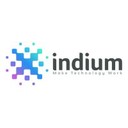Indium Software
Data Modeler/Architect – Pune or Bangalore
Job Description
Career Maturity
Core Knowledge
• Creation and management of business data models in all their forms, including conceptual models, logical data models and physical data models (relational database designs, message models and others).
• Expert level understanding of relational database concepts, dimensional database concepts and database architecture and design, ontology and taxonomy design
• Background working with key data domains as account, holding and transactions within security servicing or asset management space.
• Expertise in designing data driven solution on Snowflake for complex business needs.
• Knowledge of entire application lifecycle including Design, Development, Deployment, Operation and Maintenance in an Agile and DevOps culture.
Experience
• 10+ years of experience in data and information architecture role for a large organization.
• 10+ years of hands-on knowledge on using a variety of databases, ie Snowflake, SQL, Document and/or working within the MS Azure environment.
• 10+ years on a combination of SQL, Python, R, etc.
• At least 3+ in security servicing or asset management/investment management is highly desired.
• Understanding of Data Analysis, data modelling, DDD
Attributes
• Leadership, Analytical, problem-solving, collaborative, detail-oriented
Role Description
This person strengthens the impact of, and provides recommendations on data models and architecture that will need to be available and shared consistently across the TA organization through the identification, definition and analysis of how data related assets aid business outcomes. The Data Modeler\Architect is responsible for making data trusted, understood and easy to use.
They you will be responsible for the entire lifecycle of the data architectural assets, from design and development to deployment, operation and maintenance, with a focus on automation and quality.
Responsibilities:
• Create and manage business information models in all their forms, including conceptual models, logical data models and physical data models (relational database designs, message models and others).
• Develop standardized data and analytics platform architecture and ensure the adoption of those across the business unit.
• Secure data and analytic assets: Aid in the analysis of data and analytics security requirements and solutions, and work with the other data architects.
• Assess the benefits and the risks of information by using tools such as business capability models to create an information-centric view to quickly visualize what information matters most to the organization based on the defined business strategy.
• Enable effective data and analytics governance: Suggest who can take what actions with what information, and under what circumstances. Assist data and analytics leaders, and business and IT leadership in developing information governance processes and structures.
• Works closely with the Data Product Owners and delivery teams.
• Partners with Engineers to develop robust automation of platform deployment and update processes
• Documents design decisions and develops solutions while adhering to existing process guidelines
Skills (representative but not limited to)
• Understanding of software development life cycle including planning, development, quality assurance, change management and release management
• Strong problem-solving skills and ability to troubleshoot complex issues.
• Excellent communication and collaboration skills to work effectively in a team environment.
• Self-motivated and ability to work independently with minimal supervision.
• Excellent communication skills: experience in communicating with tech and non-tech teams
• Deep understanding of data and information architecture, especially in asset management space.
• Familiarity with MDM, data vault, and data warehouse design and implementation techniques.
• Business domain, data/content and process understanding (which are more important than technical skills). Being techno functional is a plus.
• Good presentation skills in creating Data Architecture diagrams.
• Data modelling and information classification expertise at the project and enterprise level.
• Understanding of common information architecture frameworks and information models.
• Experience with distributed data and analytics platforms in cloud and hybrid environments. Also an understanding of a variety of data access and analytic approaches (for example, microservices and event-based architectures).
• Knowledge of problem analysis, structured analysis and design, and programming techniques.



